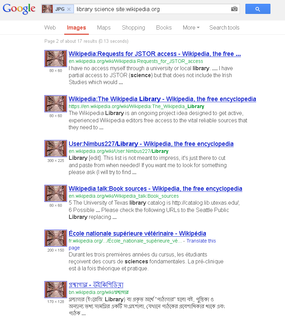
Google Search, also referred to as Google Web Search or simply Google, is a web search engine developed by Google. It is the most used search engine on the World Wide Web across all platforms, with 92.62% market share as of June 2019, handling more than 5.4 billion searches each day.
Query languages or data query languages (DQLs) are computer languages used to make queries in databases and information systems.

A web search engine or Internet search engine is a software system that is designed to carry out web search, which means to search the World Wide Web in a systematic way for particular information specified in a textual web search query. The search results are generally presented in a line of results, often referred to as search engine results pages (SERPs). The information may be a mix of links to web pages, images, videos, infographics, articles, research papers, and other types of files. Some search engines also mine data available in databases or open directories. Unlike web directories, which are maintained only by human editors, search engines also maintain real-time information by running an algorithm on a web crawler. Internet content that is not capable of being searched by a web search engine is generally described as the deep web.

Bing is a web search engine owned and operated by Microsoft. The service has its origins in Microsoft's previous search engines: MSN Search, Windows Live Search and later Live Search. Bing provides a variety of search services, including web, video, image and map search products. It is developed using ASP.NET.
Search Engine Results Pages (SERP) are the pages displayed by search engines in response to a query by a user. The main component of the SERP is the listing of results that are returned by the search engine in response to a keyword query.
Social search is a behavior of retrieving and searching on a social searching engine that mainly searches user-generated content such as news, videos and images related search queries on social media like Facebook, LinkedIn, Twitter, Instagram and Flickr. It is an enhanced version of web search that combines traditional algorithms. The idea behind social search is that instead of ranking search results purely based on semantic relevance between a query and the results, a social search system also takes into account social relationships between the results and the searcher. The social relationships could be in various forms. For example, in LinkedIn people search engine, the social relationships include social connections between searcher and each result, whether or not they are in the same industries, work for the same companies, belong the same social groups, and go the same schools, etc.
A triplestore or RDF store is a purpose-built database for the storage and retrieval of triples through semantic queries. A triple is a data entity composed of subject-predicate-object, like "Bob is 35" or "Bob knows Fred".

Reverse image search is a content-based image retrieval (CBIR) query technique that involves providing the CBIR system with a sample image that it will then base its search upon; in terms of information retrieval, the sample image is what formulates a search query. In particular, reverse image search is characterized by a lack of search terms. This effectively removes the need for a user to guess at keywords or terms that may or may not return a correct result. Reverse image search also allows users to discover content that is related to a specific sample image, popularity of an image, and discover manipulated versions and derivative works.
Yebol was a vertical "decision" search engine that had developed a knowledge-based, semantic search platform. Based in San Jose, CA, Yebol's artificial intelligence human intelligence-infused algorithms automatically cluster and categorize search results, web sites, pages and contents that it presents in a visually indexed format that is more aligned with initial human intent. Yebol used association, ranking and clustering algorithms to analyze related keywords or web pages. Yebol presented as one of its goals the creation of a unique "homepage look" for every possible search term.
Schema.org is a collaborative community activity with a mission to "create, maintain, and promote schemas for structured data on the Internet, on web pages, in email messages, and beyond." Webmasters use this shared vocabulary to structure metadata on their websites and to help search engines understand the published content, a technique known as search engine optimization.

Zanran is a search engine for data and statistics. Zanran’s focus is on finding graphs, charts and tables on the Internet, which distinguishes it from other search engines such as Google, Bing, etc. Unlike a typical search engine, the results—graphs, tables, etc.—can be previewed by mouse-hovering over the thumbnails.

The Google Knowledge Graph is a knowledge base used by Google and its services to enhance its search engine's results with information gathered from a variety of sources. The information is presented to users in an infobox next to the search results. Knowledge Graph infoboxes were added to Google's search engine in May 2012, starting in the United States, with international expansion by the end of the year. The information covered by Google's Knowledge Graph grew quickly after launch, tripling its size within seven months and answering "roughly one-third" of the 100 billion monthly searches Google processed in May 2016. It has been criticized for providing answers without source attribution or citation.

Facebook Graph Search was a semantic search engine that was introduced by Facebook in March 2013. It was designed to give answers to user natural language queries rather than a list of links. The name refers to the social graph nature of Facebook, which maps the relationships among users. The Graph Search feature combined the big data acquired from its over one billion users and external data into a search engine providing user-specific search results. In a presentation headed by Facebook CEO Mark Zuckerberg, it was announced that the Graph Search algorithm finds information from within a user's network of friends. Additional results were provided by Microsoft's Bing search engine. In July it was made available to all users using the U.S. English version of Facebook. After being made less publicly visible starting December 2014, the original Graph Search was almost entirely deprecated in June 2019.

In natural language processing, entity linking, also referred to as named-entity linking (NEL), named-entity disambiguation (NED), named-entity recognition and disambiguation (NERD) or named-entity normalization (NEN) is the task of assigning a unique identity to entities mentioned in text. For example, given the sentence "Paris is the capital of France", the idea is to determine that "Paris" refers to the city of Paris and not to Paris Hilton or any other entity that could be referred to as "Paris". Entity linking is different from named-entity recognition (NER) in that NER identifies the occurrence of a named entity in text but it does not identify which specific entity it is.

Qwant is a French web search engine, launched in July 2013 and operated from Paris. It's one of the few EU-based search engines with its own indexing engine. It claims not to employ user tracking and doesn't personalize search results in order to avoid trapping users in a filter bubble. It is available in 26 languages.
This page provides a full timeline of web search engines, starting from the Archie search engine in 1990. It is complementary to the history of web search engines page that provides more qualitative detail on the history.
Contextual search is a form of optimizing web-based search results based on context provided by the user and the computer being used to enter the query. Contextual search services differ from current search engines based on traditional information retrieval that return lists of documents based on their relevance to the query. Rather, contextual search attempts to increase the precision of results based on how valuable they are to individual users.
A knowledge engine generally refers to a tool for automatically extracting and structuring knowledge from unstructured sources, often with a way to search it.
A knowledge graph is a knowledge base that uses a graph-structured data model or topology to integrate knowledge and data. Knowledge graphs are often used to store interlinked descriptions of entities — real-world objects, events, situations or abstract concepts — with free-form semantics, not fitting into a single traditional ontology.








